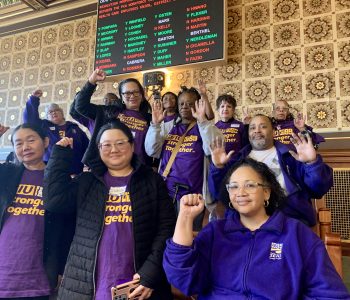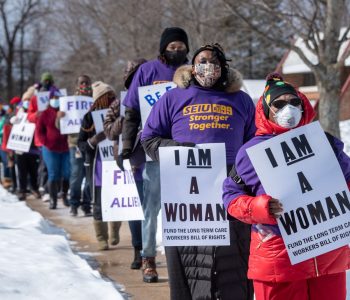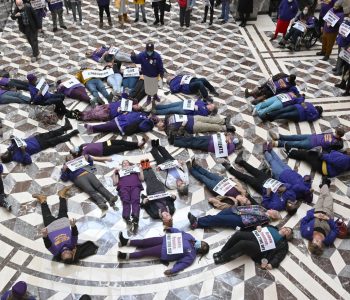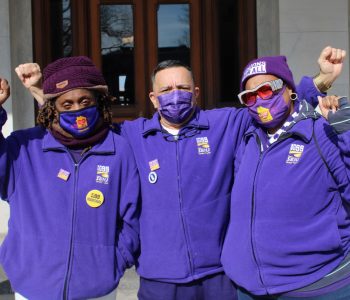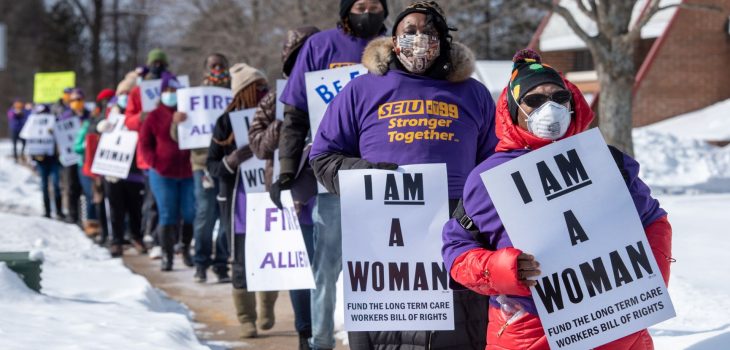 Home Care
Home Care
More than a dozen home care workers with New England Health Care Employees Union, District 1199 SEIU and their supporters were arrested Thursday after blocking the Enfield driveway of a state vendor to protest continued payroll issues with the company.
Chanting, “We do our work every day, we should be paid,” 14 home care workers sat in the street blocking the roadway after rallying for more than an hour demanding to be paid on time and without problems.
Enfield police announced that any protesters who did not make their way to their cars would be charged with creating a public disturbance and disorderly conduct. “You are on private property and property management is requesting that you leave,” an officer said.
Minutes earlier, dozens of union members lined the street leading to the company holding signs and chanting, “Give us our paychecks,” “We work hard every day,” and “We need our paychecks!”
“I shouldn’t have to face a panic attack every Thursday,” said home care worker Claire Martin during the action.
Union leaders say they have fielded thousands of grievances over the practices of Allied Community Resources, a vendor hired by the state Department of Social Services and Department of Developmental Services to issue paychecks to the 7,000 personal care assistants whose clients receive state aid. Allied is already operating under a corrective action plan in cooperation with DSS.
The union decided to take action at Allied’s Enfield office to encourage the state to move ahead with the process to replace the company when its contract expires in June.
“Personal care assistants are a low-wage workforce at $16.25 an hour,” said Diedre Murch, home care director and vice president of the union. “They have no health insurance and no paid time off. They are 90% women and 65% Black and brown women and they are running into consistent problems getting paid.”
Allied Community Resources had a pre-recorded message on their phone system Thursday indicating that all employees should not come to work on Thursday and all calls will be returned Friday.
Home care workers have reported weeks without paychecks, frustrating encounters trying to get pay issues corrected, and often mishandled or ignored complaints, union leaders said.
“It’s extra stress we don’t need dealing with these issues,” said Terrell Williams, who cares for his older brother, Edward. “It would be one thing if it was far and few between, but it’s not.”
Williams has been shorted $200 or $300 per paycheck even though he has worked the same hours each week, he said. It then takes time to get the problem straightened out, causing a problem with paying the rent on the apartment he shares with his brother, he said.
“I’ve gotten email confirmation that they received my timecard and then they said they didn’t receive it,” Williams said. “I’ve had situations where they said there was a problem, there was no problem, they agreed they made a mistake and I still didn’t get paid.”
The ongoing problems came to a head in December when all 7,000 home care workers didn’t receive their paychecks on time due to a bank error. Since then, union officials have been calling for the state to replace Allied with a different company.
The problem has become so acute that Rep. Robyn Porter, D-New Haven, and Sen. Julie Kushner, D-Danbury, co-chairs of the Labor Committee, are putting forth a bill aimed at issuing fines for vendors acting as fiscal intermediaries that don’t pay home care workers on time.

“We want to make sure they are paying in a timely fashion,” Porter said. Other portions of the bill would designate companies like Allied as an employer solely for the purpose of requiring the company to abide by state labor laws.
Currently home care workers are not considered state employees although they are paid through DSS and DDS Medicaid funding.
The bill would also require vendors to correct any problems and make payment within 48 hours. The companies could be fined daily for missed paychecks, Porter said.
“We are in the middle of a pandemic and people are going weeks without being paid,” Porter said. “When I found out about it, it blew my mind. These are hard-working women, 60% people of color who are working and relying on public assistance because they aren’t always paid and because their pay is so low they have to work two and three jobs and still need public assistance.”
The bill is being drafted and will be taken up by the committee when it’s finished.
Allied processed 49,900 timesheets last month and .9% were not paid on time, mostly because of errors that had to be rectified first, according to DSS officials.
The RFP for the contract will go out this summer, said DSS spokesman David Dearborn. The pandemic has held up the contract process a bit and there is a push to put out an interagency RFP, Dearborn said. That process typically takes longer, he said.
Dearborn said the DSS-directed corrective action plan focuses on making sure call-center wait times are within contract standards and that the maximum number of timesheets are paid in each time period.
The company is slated to receive $775,377 in fiscal year 2021 for its payroll processing work with the DSS home care program, Dearborn said. That is a fraction of the $14,749,045 in state funds that DSS will pay Allied for contracted services this fiscal year.
“In the longer term, the state will be implementing a new ‘electronic visit verification’ system,” Dearborn said. “This will replace paper timesheets and greatly reduce errors to streamline the whole payroll system for our personal care assistants.”
But for now, union officials are concerned that the corrective action plan isn’t working quickly enough. As union members and supporters chanted, “We shall overcome,” Enfield police escorted each one off the property. They were charged and released, according to union officials.
“Thursday around 6 p.m. is a busy time for me,” said Martin, who cares for an 85-year-old woman with dementia. “It’s the time when I begin to close the day, when all my attention should be focused on my client. But because of Allied, I start to panic, because if I haven’t gotten my pay confirmation by then, I might not be getting paid at all.”
Original Article from CT News Junkie
